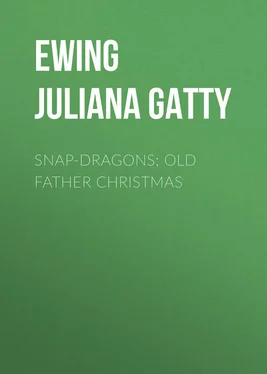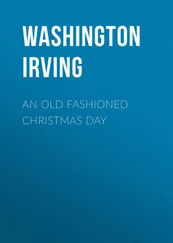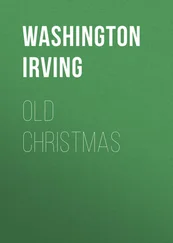Juliana Ewing - Snap-Dragons; Old Father Christmas
Здесь есть возможность читать онлайн «Juliana Ewing - Snap-Dragons; Old Father Christmas» — ознакомительный отрывок электронной книги совершенно бесплатно, а после прочтения отрывка купить полную версию. В некоторых случаях можно слушать аудио, скачать через торрент в формате fb2 и присутствует краткое содержание. Жанр: foreign_antique, foreign_prose, foreign_sf, на английском языке. Описание произведения, (предисловие) а так же отзывы посетителей доступны на портале библиотеки ЛибКат.
- Название:Snap-Dragons; Old Father Christmas
- Автор:
- Жанр:
- Год:неизвестен
- ISBN:нет данных
- Рейтинг книги:4 / 5. Голосов: 1
-
Избранное:Добавить в избранное
- Отзывы:
-
Ваша оценка:
- 80
- 1
- 2
- 3
- 4
- 5
Snap-Dragons; Old Father Christmas: краткое содержание, описание и аннотация
Предлагаем к чтению аннотацию, описание, краткое содержание или предисловие (зависит от того, что написал сам автор книги «Snap-Dragons; Old Father Christmas»). Если вы не нашли необходимую информацию о книге — напишите в комментариях, мы постараемся отыскать её.
Snap-Dragons; Old Father Christmas — читать онлайн ознакомительный отрывок
Ниже представлен текст книги, разбитый по страницам. Система сохранения места последней прочитанной страницы, позволяет с удобством читать онлайн бесплатно книгу «Snap-Dragons; Old Father Christmas», без необходимости каждый раз заново искать на чём Вы остановились. Поставьте закладку, и сможете в любой момент перейти на страницу, на которой закончили чтение.
Интервал:
Закладка:
“Plenty of men are grey at thirty,” said Mr Skratdj. “I knew a man who was grey at twenty-five.”
“Well, forty or thirty-five, it doesn’t much matter,” said Mrs Skratdj, about to resume her narration.
“Five years matter a good deal to most people at thirty-five,” said Mr Skratdj, as he walked towards the door. “They would make a remarkable difference to me, I know;” and with a jocular air Mr Skratdj departed, and Mrs Skratdj had the rest of the anecdote her own way.
The Spirit of Contradiction finds a place in most nurseries, though to a very varying degree in different ones. Children snap and snarl by nature, like young puppies; and most of us can remember taking part in some such spirited dialogues as the following: —
“I will.” “You daren’t.”
“You can’t.” “I dare.”
“You shall.” “I’ll tell Mamma.”
“I won’t.” “I don’t care if you do.”
It is the part of wise parents to repress these squibs and crackers of juvenile contention, and to enforce that slowly-learned lesson, that in this world one must often “pass over” and “put up with” things in other people, being oneself by no means perfect. Also that it is a kindness, and almost a duty, to let people think and say and do things in their own way occasionally.
But even if Mr and Mrs Skratdj had ever thought of teaching all this to their children, it must be confessed that the lesson would not have come with a good grace from either of them, since they snapped and snarled between themselves as much or more than their children in the nursery.
The two eldest were the leaders in the nursery squabbles. Between these, a boy and a girl, a ceaseless war of words was waged from morning to night. And as neither of them lacked ready wit, and both were in constant practice, the art of snapping was cultivated by them to the highest pitch.
It began at breakfast, if not sooner.
“You’ve taken my chair.”
“It’s not your chair.”
“You know it’s the one I like, and it was in my place.”
“How do you know it was in your place?”
“Never mind. I do know.”
“No, you don’t.”
“Yes, I do.”
“Suppose I say it was in my place.”
“You can’t, for it wasn’t.”
“I can, if I like.”
“Well, was it?”
“I sha’n’t tell you.”
“Ah! that shews it wasn’t.”
“No, it doesn’t.”
“Yes, it does.”
Etcetera, etcetera, etcetera.
The direction of their daily walks was a fruitful subject of difference of opinion.
“Let’s go on the Common to-day, Nurse.”
“Oh, don’t let’s go there; we’re always going on the Common.”
“I’m sure we’re not. We’ve not been there for ever so long.”
“Oh, what a story! We were there on Wednesday. Let’s go down Gipsey Lane. We never go down Gipsey Lane.”
“Why, we’re always going down Gipsey Lane. And there’s nothing to see there.”
“I don’t care. I won’t go on the Common, and I shall go and get Papa to say we’re to go down Gipsey Lane. I can run faster than you.”
“That’s very sneaking; but I don’t care.”
“Papa! Papa! Polly’s called me a sneak.”
“No, I didn’t, Papa.”
“You did.”
“No, I didn’t. I only said it was sneaking of you to say you’d run faster than me, and get Papa to say we were to go down Gipsey Lane.”
“Then you did call him sneaking,” said Mr Skratdj. “And you’re a very naughty ill-mannered little girl. You’re getting very troublesome, Polly, and I shall have to send you to school, where you’ll be kept in order. Go where your brother wishes at once.”
For Polly and her brother had reached an age when it was convenient, if possible, to throw the blame of all nursery differences on Polly. In families where domestic discipline is rather fractious than firm, there comes a stage when the girls almost invariably go to the wall, because they will stand snubbing, and the boys will not. Domestic authority, like some other powers, is apt to be magnified on the weaker class.
But Mr Skratdj would not always listen even to Harry.
“If you don’t give it me back directly, I’ll tell about your eating the two magnum-bonums in the kitchen garden on Sunday,” said Master Harry on one occasion.
“Tell-tale tit!
Your tongue shall be slit,
And every dog in the town shall have a little bit,”
quoted his sister.
“Ah! You’ve called me a tell-tale. Now I’ll go and tell Papa. You got into a fine scrape for calling me names the other day.”
“Go, then! I don’t care.”
“You wouldn’t like me to go, I know.”
“You daren’t. That’s what it is.”
“I dare.”
“Then why don’t you?”
“Oh, I am going; but you’ll see what will be the end of it.”
Polly, however, had her own reasons for remaining stolid, and Harry started. But when he reached the landing he paused. Mr Skratdj had especially announced that morning that he did not wish to be disturbed, and though he was a favourite, Harry had no desire to invade the dining-room at this crisis. So he returned to the nursery, and said with a magnanimous air, “I don’t want to get you into a scrape, Polly. If you’ll beg my pardon I won’t go.”
“I’m sure I sha’n’t,” said Polly, who was equally well informed as to the position of affairs at head-quarters. “Go, if you dare.”
“I won’t if you want me not,” said Harry, discreetly waiving the question of apologies.
“But I’d rather you went,” said the obdurate Polly. “You’re always telling tales. Go and tell now, if you’re not afraid.”
So Harry went. But at the bottom of the stairs he lingered again, and was meditating how to return with most credit to his dignity, when Polly’s face appeared through the banisters, and Polly’s sharp tongue goaded him on.
“Ah! I see you. You’re stopping. You daren’t go.”
“I dare,” said Harry; and at last he went.
As he turned the handle of the door, Mr Skratdj turned round.
“Please, Papa – ” Harry began.
“Get away with you!” cried Mr Skratdj. “Didn’t I tell you I was not to be disturbed this morning? What an extraor – ”
But Harry had shut the door, and withdrawn precipitately.
Once outside, he returned to the nursery with dignified steps, and an air of apparent satisfaction, saying, —
“You’re to give me the bricks, please.”
“Who says so?”
“Why, who should say so? Where have I been, pray?”
“I don’t know, and I don’t care.”
“I’ve been to Papa. There!”
“Did he say I was to give up the bricks?”
“I’ve told you.”
“No, you’ve not.”
“I sha’n’t tell you any more.”
“Then I’ll go to Papa and ask.”
“Go by all means.”
“I won’t if you’ll tell me truly.”
“I sha’n’t tell you anything. Go and ask, if you dare,” said Harry, only too glad to have the tables turned.
Polly’s expedition met with the same fate, and she attempted to cover her retreat in a similar manner.
“Ah! you didn’t tell.”
“I don’t believe you asked Papa.”
“Don’t you? Very well!”
“Well, did you?”
“Never mind.”
Etcetera, etcetera, etcetera.
Meanwhile Mr Skratdj scolded Mrs Skratdj for not keeping the children in better order. And Mrs Skratdj said it was quite impossible to do so, when Mr Skratdj spoilt Harry as he did, and weakened her (Mrs Skratdj’s) authority by constant interference.
Difference of sex gave point to many of these nursery squabbles, as it so often does to domestic broils.
Читать дальшеИнтервал:
Закладка:
Похожие книги на «Snap-Dragons; Old Father Christmas»
Представляем Вашему вниманию похожие книги на «Snap-Dragons; Old Father Christmas» списком для выбора. Мы отобрали схожую по названию и смыслу литературу в надежде предоставить читателям больше вариантов отыскать новые, интересные, ещё непрочитанные произведения.
Обсуждение, отзывы о книге «Snap-Dragons; Old Father Christmas» и просто собственные мнения читателей. Оставьте ваши комментарии, напишите, что Вы думаете о произведении, его смысле или главных героях. Укажите что конкретно понравилось, а что нет, и почему Вы так считаете.












